
A lot of barrels are opened in "The Wild Boar" tavern. But the innkeeper is a sly old dog! Whereas he treats humble guests to free rounds, he just closes the tap to hard-drinking boozers and keeps the cool brew for himself.

Components
- 1 barrel-rolling cup
- 7 number barrels
- 2 dark special barrels
- 6 coasters
- 48 game cards in 6 colors
- 1 notepad
- Instructions
Object of the Game
Each round, a different player is the generous innkeeper. His thirsty guests compete to guzzle down as much as possible from the free-flowing cool brew. Basically, this is quite simple: Whoever orders more, gets more.
However, the tap stays closed, if all guests together order more than the innkeeper wants to serve. The player who loads up on 75 mugs (or more) after several boozy rounds wins.
Setup
Each player puts a coaster in front of him.
A soberly calculating player gets the notepad and a pen.
Each player gets the 8 cards of one color and holds them hidden from the other players.
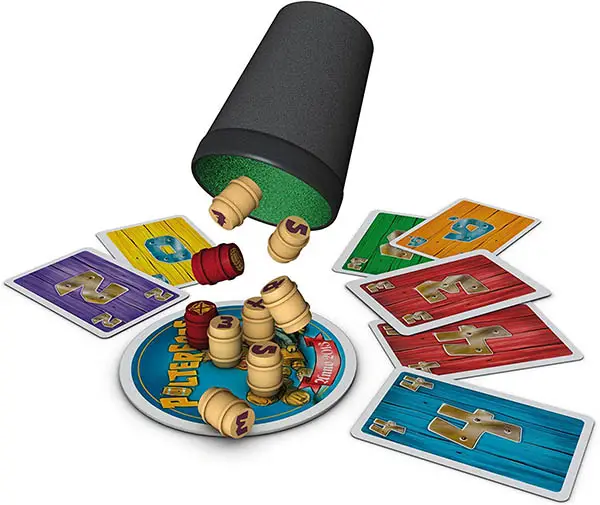
Game Play
In each game round, one of the players becomes the innkeeper. In the first round, it's the most generous player. At the beginning of each new game round, the role of the innkeeper moves on in clockwise direction. The innkeeper obtains all barrels and the cup. All the other players are guests.
Each game round consists of 5 phases, always played in the following order:
- Phase 1: First Roll
- Phase 2: The Guests' Order
- Phase 3: Serving
- Phase 4: The Calculation of Barrels
- Phase 5: The Bill
Phase 1: First Roll
The innkeeper rolls all barrels onto his coaster and shows the result to all players. If no number barrel winds up standing, he keeps rolling until at least one number barrel ends up standing.
The innkeeper puts all standing barrels next to his coaster.
The innkeeper does not let the others know yet whether he wants to keep rolling. (But he may make wild assertions about it).
Phase 2: The Guests' Order
Each guest lays one or two cards face down in front of him. The card values indicate how many mugs he wants to get.
 Frances orders 8, Becky 7, and Benedict 2 mugs |
What the guests need to know for their order:
Each guest will only get the number of mugs he ordered, if the innkeeper serves at least as much as all guests together have ordered, or if none of the barrels of the current roll stands upright.
Phase 3: Serving
The innkeeper keeps serving until he either turns off the tap or none of his barrels stands upright.
First, the innkeeper decides whether to turn off the tap immediately (case A) or whether he keeps rolling the barrels (case B).
Case A
The innkeeper finishes serving immediately. He does not continue rolling but turns off the tap. Now, phase 4, "The Calculation of Barrels", follows immediately. For this, he has to calculate all currently standing barrels.
Case B
If the innkeeper keeps rolling, he observes the following barrel-rolling rules:
He leaves all number barrels alone that are standing; he may not use them for additional rolls, even later on.
He throws all barrels that are lying down into the cup to roll them again.
For each special barrel that is standing, he may decide for each one individually whether he wants to leave it standing or throw it into the dice cup. He may also use special barrels that he left standing after previous rolls and include them in any later roll.
Now he rerolls the barrels (that he had thrown back into the dice cup) onto his coaster and shows the results to all players.

Example: Three number barrels and both special barrels are standing.
If the innkeeper continues rolling, he has to leave the three standing number barrels alone, but he may freely choose whether he wants to leave one or both special barrels standing or include one or both special barrels in his new roll.
After each further roll, there are always these two possibilities:
-
No barrel (of the current roll) is standing!
 Serving is over!
Serving is over!
Bad luck! No barrel is standing upright.
The innkeeper has failed!
If no barrels of the current roll stand upright, the innkeeper has failed. He has to finish serving. Now phase 5, "The bill", follows immediately, in which the innkeeper will now go away empty-handed.
-
At least one barrel (of the current roll) is standing!
 The serving can go on!
The serving can go on!
As a barrel is standing upright, the innkeeper may continue rolling.
If at least one barrel of the current roll is standing, the innkeeper decides a new whether he
- turns off the tap (stops rolling) or
- continues the serving (by continuing rolling).
The innkeeper may keep rolling until no barrels stand upright after a roll (see illus. 4) or he turns off the tap (case A).
Phase 4: The Calculation of Barrels
Important: If, after the last roll, no barrel is standing upright, no calculation of barrels takes place. In this case, go immediately to phase 5, "The bill".
As soon as the innkeeper has turned off the tap, the barrels are calculated. The result of the calculation determines how many mugs the innkeeper will actually serve. To this end, the innkeeper has to calculate all standing barrels as follows:
Standing special barrels showing
 are considered spoiled. For each of these barrels, the innkeeper destroys any one number barrel that's standing.
are considered spoiled. For each of these barrels, the innkeeper destroys any one number barrel that's standing.If a standing special barrel shows
 the innkeeper doubles the value of a standing number barrel of his choice.
the innkeeper doubles the value of a standing number barrel of his choice.The (if applicable, doubled) values on the top of all barrels standing undestroyed are added up.
The result indicates how many mugs the innkeeper has actually served. This is written down on the notepad in the "Serving" column.

Examples:

The total of the number barrels standing is 20 mugs. The innkeeper uses the special barrel  to destroy one "3" barrel; consequently, there are only 17 mugs left. Now he doubles the value of the "9" barrel. The amount he served is 26 mugs.
to destroy one "3" barrel; consequently, there are only 17 mugs left. Now he doubles the value of the "9" barrel. The amount he served is 26 mugs.
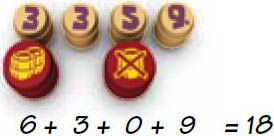
If the innkeeper had decided to destroy the "5" barrel and to double the value of a "3" barrel, he would have served 18 mugs.
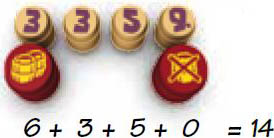
If he had destroyed the "9" doubled a "3" barrel, the actual served amount would be reduced to 14 mugs.
If both special barrels show  the innkeeper doubles the values of two different standing number barrels of his choice.
the innkeeper doubles the values of two different standing number barrels of his choice.
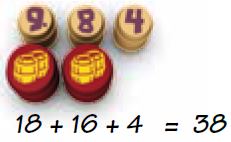
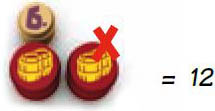
If only one number barrel is standing, the second  special barrel goes to waste
special barrel goes to waste
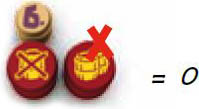
If two different special barrels but only one number barrel are standing, only the effect of the destroying  barrel is executed. The doubling does not take place.
barrel is executed. The doubling does not take place.
Special barrels that are lying down - like all lying barrels - have no effect.
Phase 5: The Bill
Now players settle the bill! All guests make their orders known. To this end, they reveal the cards they have laid out. If the innkeeper has failed, players score as follows:

Each writes as many mugs on the notepad as correspond to his own order (total of his card numbers).
The innkeeper gets nothing.

Example: No barrel is standing upright after the last roll, the innkeeper goes away empty-handed. Benedict gets the 13 mugs he ordered.
For both Becky and Pauline, 7 mugs are noted. And Frances also "receives" the 0 mugs that she ordered - that means, nothing.
Note: Case B above shows why it might make sense to play only the "0": "The guests are too greedy!"
If the innkeeper has turned off the tap (and thus forgoes further rolling), the scoring is done as follows: The numbers on all played cards are added up.
This total of all ordered mugs are written down in the "Ordering" column on the notepad. 

Example: The guests have ordered 20 mugs overall.
Now players check whether all guests together have ordered more than the innkeeper has served.
There are two possibilities:
- Case A: There is enough for all!
- Case B: The guests are too greedy!
Case A: There is enough for all!
The innkeeper has served at least as many mugs as all guests together have ordered.
Each guest obtains as many mugs as he has ordered.
The innkeeper receives the "rest", i.e., the difference between the amount he has served and the amount all guests have ordered.
In order to keep a tally of the score, players note these mug numbers on the notepad. There, you should always note down the result of the current round and the total of all rounds for each player.

Innkeeper Augustus has served 26 mugs. All guests together have ordered only 20 mugs. There is enough for all. Therefore, each player has credited the mugs he has ordered; Frances gets 1 mug; so her overall result (for all game rounds) is 19 mugs.
Benedict and Becky receive the 7 mugs each has ordered; with this, they improve their total result to -1 (Benedict) and 15 (Becky). Pauline obtains the 5 mugs she has ordered. Innkeeper Augustus is left with 6 mugs that nobody has ordered.
Case B: The guests are too greedy!
All guests together have ordered more than the innkeeper has served.
The innkeeper gets the entire amount he has served.
The player who has made the highest order is the greediest guest. This can be several guests (in the case of exactly identical orders, even all guests). The greediest guest "receives" the amount he has ordered in the form of minus points. Because of this, the total score of some players can pour into minus territory.
The player who has made the lowest order (it can be several players) gets the amount that the greediest guest has ordered.
The scores of all players are written down on the notepad.
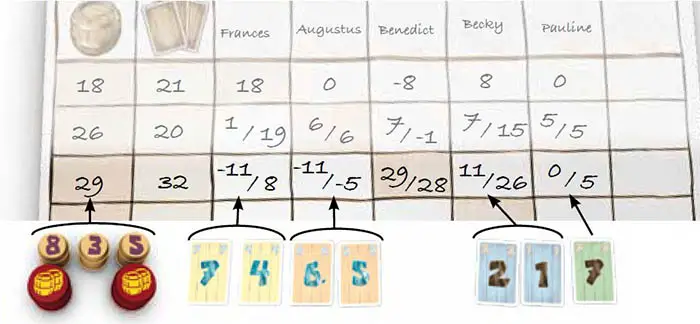
Example: The guests have ordered more (32 mugs) than innkeeper Benedict has served (29 mugs). Benedict scores for all 29 mugs.
Augustus and Frances, who have both made the highest order (11 mugs) are penalized for their greed; both have to deduct this order amount from their total.
Becky, with the most modest order, scores the 11 mugs that the intemperate guests Augustus and Frances have ordered (but only once, which means not 22 mugs).
New Rounds
The innkeeper hands all barrels in the cup to his left neighbor.
This player now becomes the innkeeper for the next round. Each guest takes back all his own game cards and holds them hidden from the others.
End of the Game
The game ends when at least one player reaches a total of 75 mugs (or more) at the end of a round. The player with the most mugs wins.
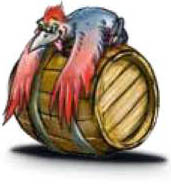
Continue Reading
